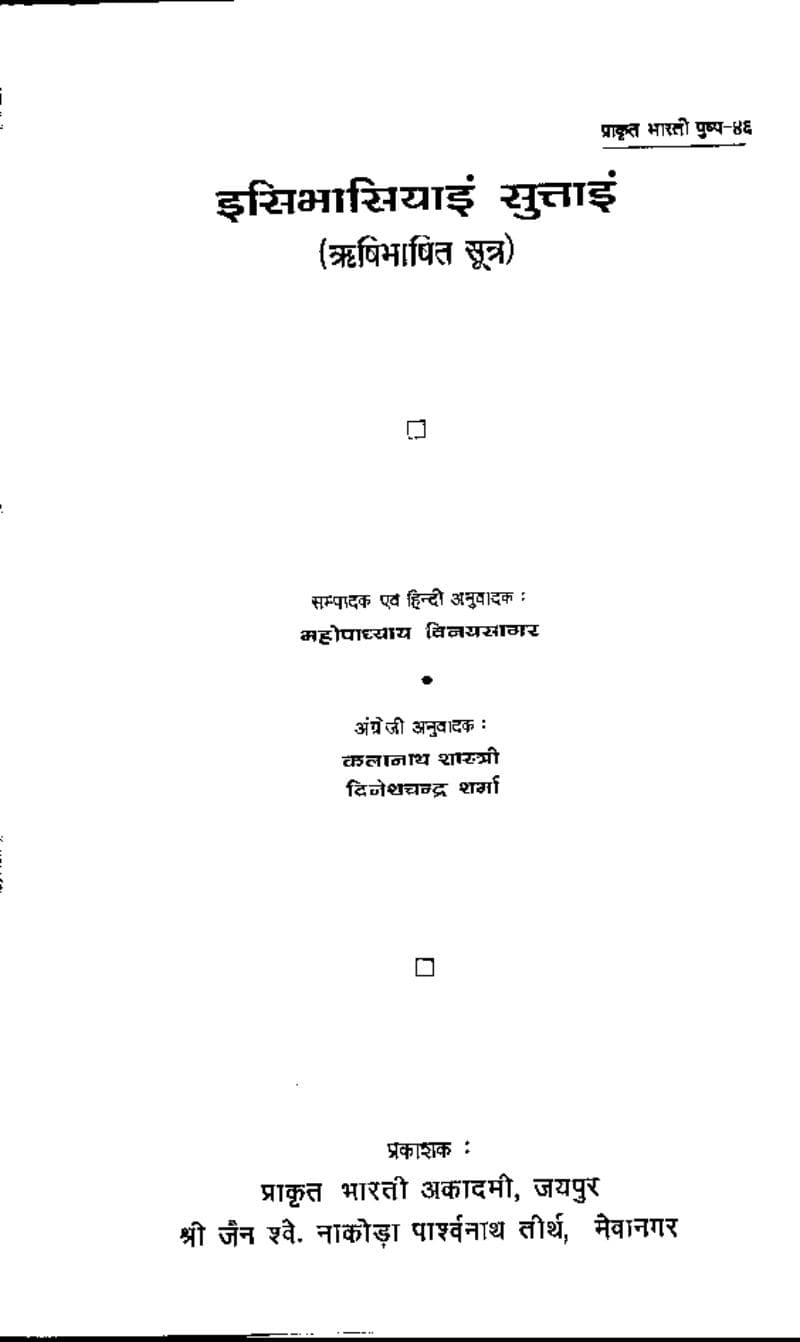Isibhasiyaimsuttaim
Added to library: September 1, 2025

Summary
This document is a summary of the Jain text "Isibhasiyaimsuttaim" (also known as Rishibhashit) authored by Vinaysagar and published by Prakrit Bharti Academy. The provided text contains numerous pages, each detailing specific chapters and verses attributed to various ancient sages. The core of the book appears to be a collection of sayings or teachings of these sages, likely focusing on Jain principles, ethics, and philosophy.
Here's a breakdown of the information presented:
Overall Content:
- The book is a compilation of the teachings of numerous ancient sages (Rishis) as recorded in the Isibhasiyaimsuttaim.
- The table of contents (Page 2 onwards) lists over 120 different sages, with each entry referencing specific chapters or sections of their attributed teachings. These range from well-known figures like Mahakashyap and Parshwa to others like Narad, Angiras, and less familiar names.
- The text is presented in Prakrit, with an introduction and possibly translations or commentary provided in English (indicated by "Publisher's Note" and "Translator's Note").
- The catalog link points to a Jain resource, suggesting the text is a significant Jain scripture.
Key Themes and Structure (Based on Chapter Titles and Snippets):
While a full translation isn't provided, the recurring themes and the nature of the chapter titles suggest the following:
- Ethical Conduct: Many chapters are named after sages and likely contain their pronouncements on right living, ethical behavior, and moral principles. Terms like "non-violence," "non-attachment," "purity," "penance," and "virtue" appear in snippets, indicating these are central themes.
- Spiritual Progress: The sayings likely guide the aspirant towards spiritual advancement, enlightenment, liberation (emancipation), and the ultimate goal of Jainism.
- Karma and Reincarnation: The text seems to delve into the concepts of Karma, its generation, its effects, and the cycle of rebirth (reincarnation). The need to purify oneself from Karmic smear and the ultimate aim of breaking free from this cycle are likely highlighted.
- Self-Control and Detachment: The emphasis on restraining senses, overcoming desires, and cultivating detachment from worldly pleasures and possessions is evident.
- Discernment: A key aspect appears to be the ability to discern truth from falsehood, virtue from vice, and the self from the non-self.
- Wisdom and Knowledge: The teachings emphasize the acquisition of true and eternal knowledge that leads to self-realization and liberation.
- The Nature of Existence: Snippets suggest discussions on the nature of the world, its components (animate and inanimate), and the concept of destiny.
- Saints and Ascetics: The text likely discusses the conduct and practices of true saints and ascetics, differentiating them from those who merely adopt the outward appearance. The importance of their company and guidance is also likely stressed.
Methodology of Teachings:
- The text presents teachings in a concise, aphoristic style, often attributed to individual sages.
- The use of analogies and comparisons is evident, such as comparing the soul's journey to that of a seed germinating or a potter shaping clay.
- The structure seems to be a collection of individual discourses or sayings, each offering wisdom on specific aspects of spiritual life.
Appendices and Further Information:
- The book includes appendices (Page 5), likely containing additional scholarly material, such as a study of Rishibhashit or further elaborations on the text.
- The extensive footnotes and references in the later pages suggest a scholarly analysis of the text, drawing parallels with various other scriptures and philosophical systems (both Jain and potentially from other traditions like Buddhism and Vedic texts).
In Essence:
The "Isibhasiyaimsuttaim" is a profound Jain scripture that acts as a guide for spiritual seekers. Through the collected wisdom of numerous ancient sages, it offers practical advice and philosophical insights on ethical conduct, self-control, the nature of karma, and the path to liberation from the cycle of birth and death. The book emphasizes the importance of discerning true knowledge, cultivating virtue, and living a life of detachment and austerity.